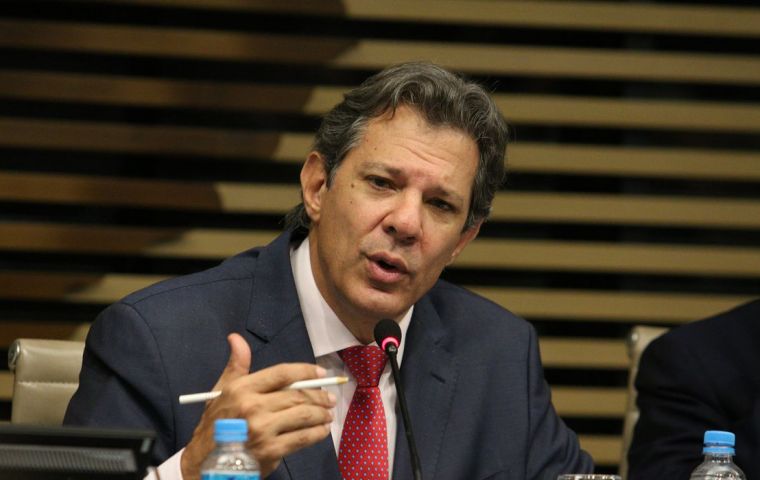MercoPress. South Atlantic News Agency
Brazil: Haddad congratulates Congress and STF for better S&P ratings
 Haddad wants the Central Bank to lower the Selic interest rate
Haddad wants the Central Bank to lower the Selic interest rate Brazil's Finance Minister Fernando Haddad Wednesday said that the improved outlook by the risk rating agency Standard & Poor's (S&P) was due to the harmony between the branches of government, Agencia Brasil reported. In Haddad's view, National Congress and the Federal Supreme Court (STF) have an important role in the S&P's decision, but the Central Bank (BCB) needs to “join the effort” and start reducing the interest rates.
The minister recalled that the S&P statement cited the discussions of the new fiscal framework and tax reform as one of the reasons that led the agency to confirm the possibility of improving Brazil's rating in the next two years. He thanked the presidents of the House of Representatives, Arthur Lira (PP-AL), and the Senate, Rodrigo Pacheco (PSD-MG), for their efforts to consolidate public accounts.
“There is a lot of work ahead. It is just a beginning, but if we maintain the work rhythms of the Houses [of Congress] and the Judiciary, we will achieve our goals. Brazil has to grow again. I think that the harmony between the Powers has contributed to this result, it is a change of bias and route, [and] it is very significant,” declared the minister, for whom the performance of the BCB is now important, with the reduction of interest rates. “I was talking about harmonization. The Central Bank has yet to join this effort, but I believe that we are about to see this happen. When we are all aligned, we will prosper,” he insisted.
Next week, the Monetary Policy Committee (Copom) will meet to decide the Selic Rate (the economy's basic interest rate). Currently, the rate is at 13.75% per year, at the highest level since January 2017. Despite having classified the tone of some minutes of recent Copom meetings as harsh, the minister said that the monetary authority is becoming sensitized to the requests from industry and retail to start reducing interest rates.
“I want, as soon as possible, to thank the monetary authority, which with each statement demonstrates that it is sensitive to the clamor of the business community, banks, and risk agencies and that it is possible for the harmony to be even greater,” said Haddad, citing an earlier meeting with the Institute for Retail Development (IDV).
About a possible return of the investment grade, a guarantee that the country does not run the risk of defaulting on its public debt, Haddad said he believes in the resumption of the good payer seal. “Brazil will resume”, declared the minister, reminding that the country is currently growing more and having lower inflation than several developed countries.
Brazil obtained the investment grade in 2008, during the second term of the government of President Luiz Inácio Lula da Silva. The country lost the seal in 2015, in the second term of President Dilma Rousseff. Currently, S&P grants Brazil a BB- rating, three levels below investment grade.
(Source: Agencia Brasil)




Top Comments
Disclaimer & comment rulesCommenting for this story is now closed.
If you have a Facebook account, become a fan and comment on our Facebook Page!